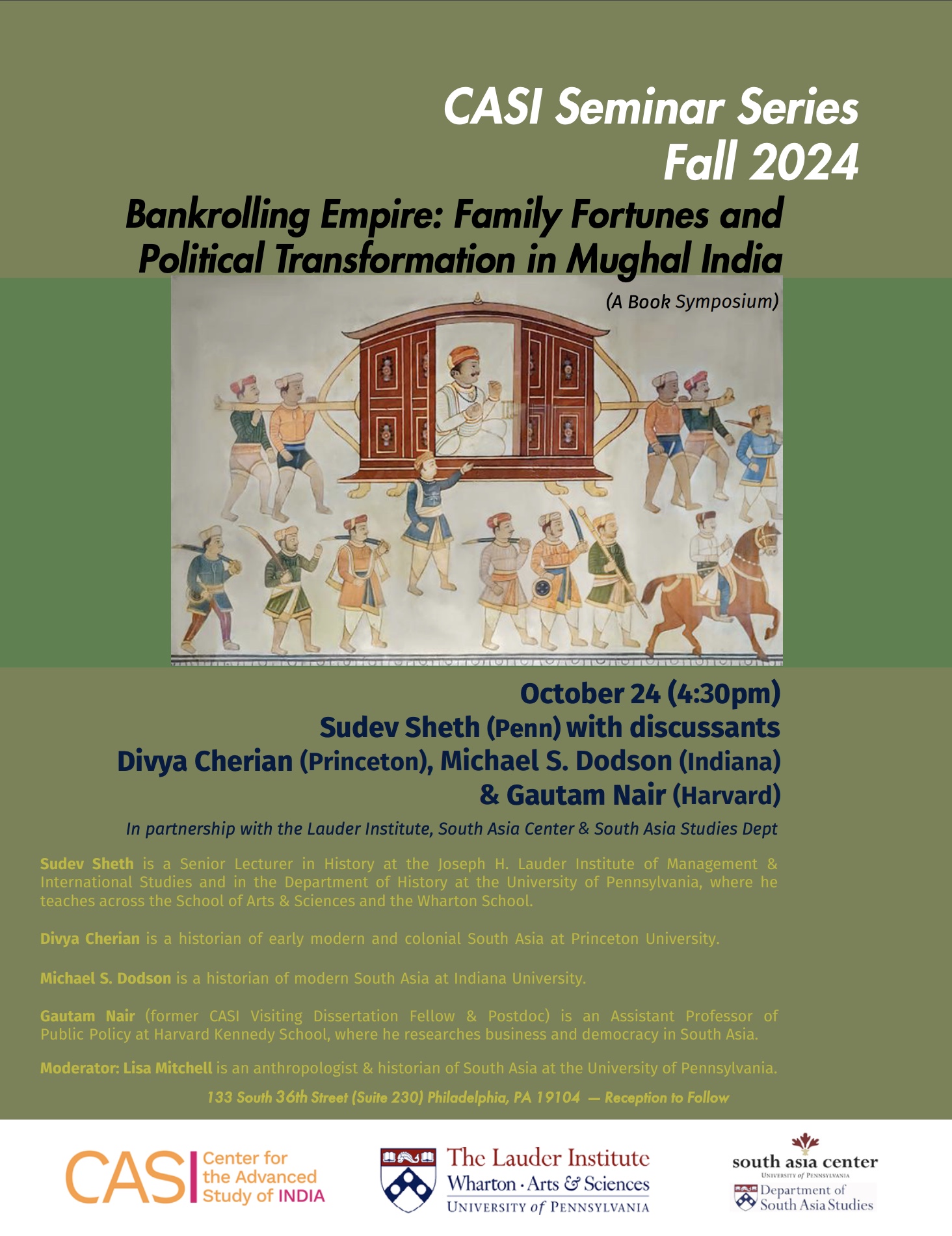Event
Bankrolling Empire: Family Fortunes and Political Transformation in Mughal India (A Book Symposium)
CASI Seminar Series in partnership with the South Asia Center, Lauder Institute, & South Asia Studies Dept
Sudev Sheth Senior Lecturer, History, The Lauder Institute, University of Pennsylvania

This symposium features a conversation around Sudev Sheth’s new book Bankrolling Empire: Family Fortunes and Political Transformation in Mughal India (CUP, 2024) about how a family of diamond dealers deployed wealth and information to maneuver around political leaders and survive the collapse of the Mughal Empire. The story highlights the unique role played by Gujarati bankers in the practice of government by Indian and colonial rulers. Sheth employs new and unconventional sources—Persian diaries, Gujarati poems, French trading manuals, Marathi letters, Sanskrit hymns, and Dutch shipping records—to tap into the fascinating lives of these entrepreneurs. Spanning several political dynasties and still thriving today as a billion-dollar family firm in its fourteenth generation, the history and legacy of the Jhaveri family helps us see social change through fresh eyes. Historian Divya Cherian and political scientist Gautam Nair will offer comments about the book, including its relevance for understanding state power and capitalist relations in modern India.
About the Author:Sudev Sheth is a Senior Lecturer in History at the Joseph H. Lauder Institute of Management & International Studies and in the Department of History at the University of Pennsylvania, where he teaches across the School of Arts & Sciences and the Wharton School. His writings have appeared in top academic journals and popular outlets, including The Conversation, Economic & Political Weekly, Mint, Knowledge at Wharton, and Harvard Business Publishing. He was previously a Harvard-Newcomen Fellow in Business History at Harvard Business School.
Discussants:Divya Cherian is an Associate Professor of History at Princeton University. She is a historian of early modern and colonial South Asia, with interests in social, cultural, and religious history, gender and sexuality, ethics and law, and the local and the everyday. Her research focuses on western India, chiefly on the region that is today Rajasthan. She is the author of Merchants of Virtue: Hindus, Muslims, and Untouchables in Eighteenth-Century South Asia (Oakland: University of California Press, 2023).
Michael S. Dodson is a Professor of History at Indiana University. His research focuses on the intellectual and cultural history of South Asia during the nineteenth and twentieth centuries, with a special interest in urbanism and architecture. He is currently writing a history of modernist architecture and city planning in Delhi during the 1960s and 70s. He is author of Bureaucracy, Belonging, and the City in North India, 1870-1930 (London: Routledge, 2020).
Gautam Nair is an Assistant Professor of Public Policy at the Harvard Kennedy School, where he is a faculty affiliate of the Ash Center for Democratic Governance and Innovation and the Center for International Development. His research focuses on the politics of inequality and redistribution and seeks to understand the conditions under which democratic competition revolves around broad-based public investments and social transfers rather than politically targeted private goods. He was a 2019-20 CASI Visiting Dissertation Fellow and Postdoc.
Moderator:
Lisa Mitchell is Chair and Professor of Anthropology & History in the Department of South Asia Studies at the University of Pennsylvania. She is the author of Hailing the State: Indian Democracy between Elections (Duke University Press, 2023). In 2020, she was a recipient of the Lindback Award for Distinguished Teaching at the University of Pennsylvania.
